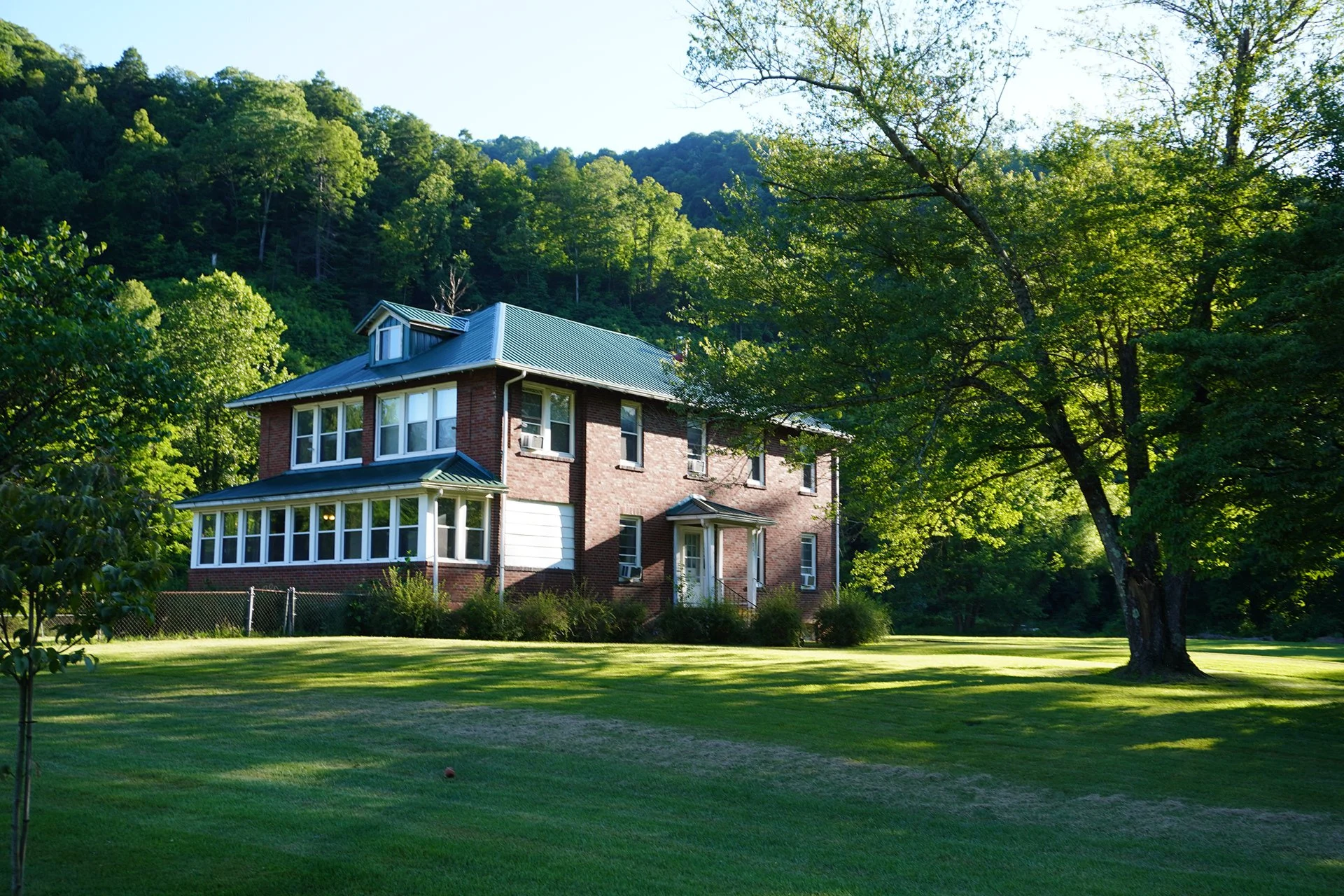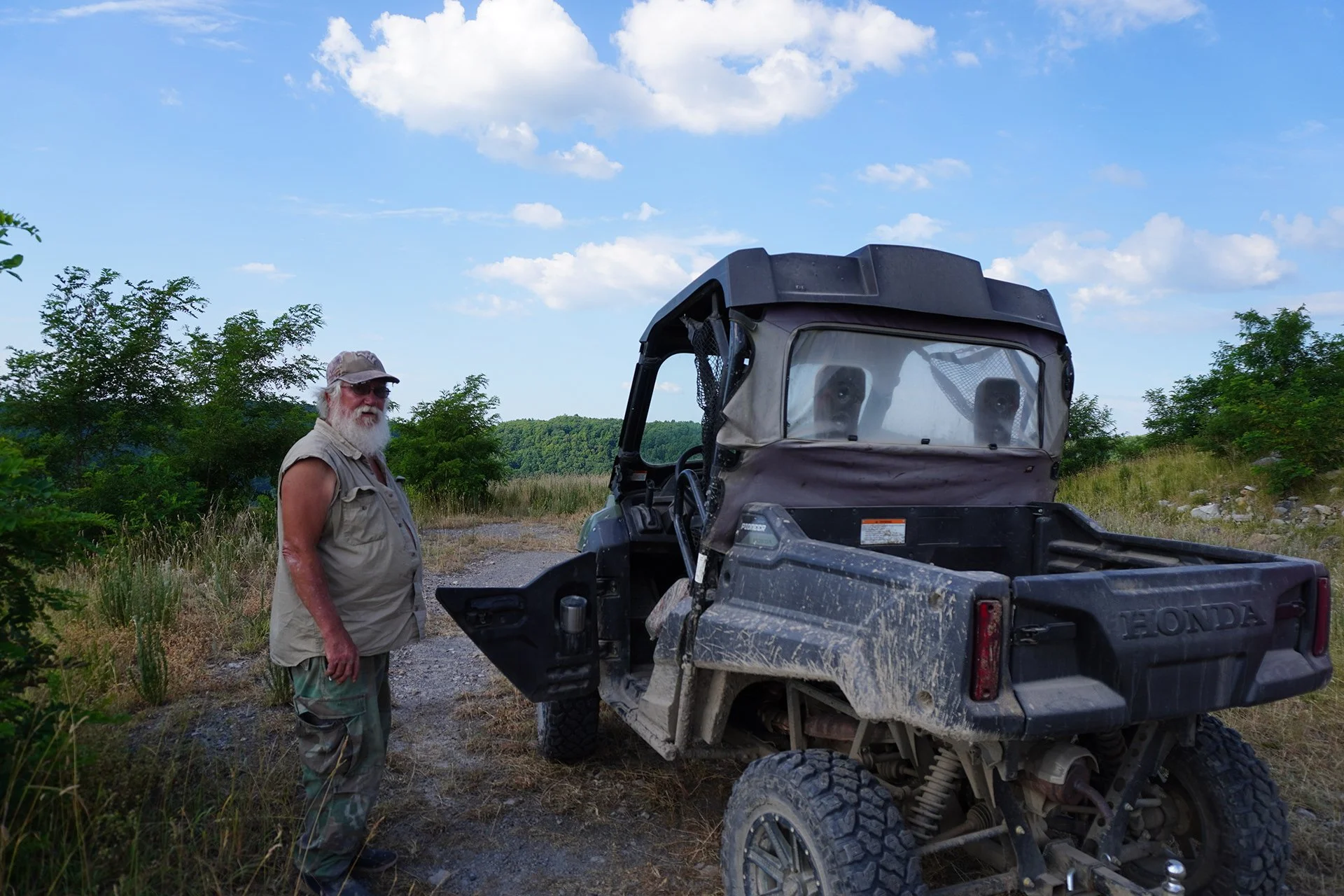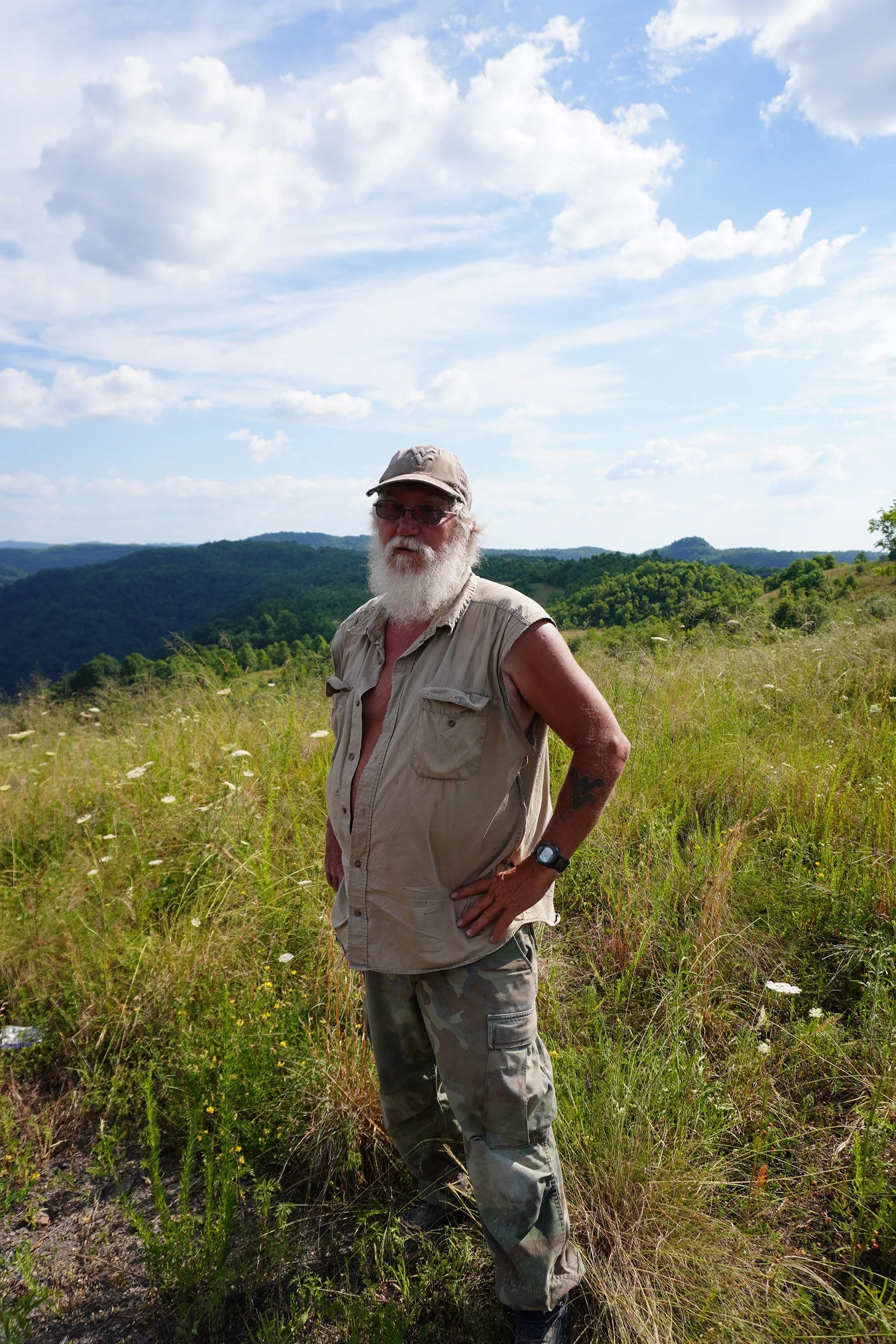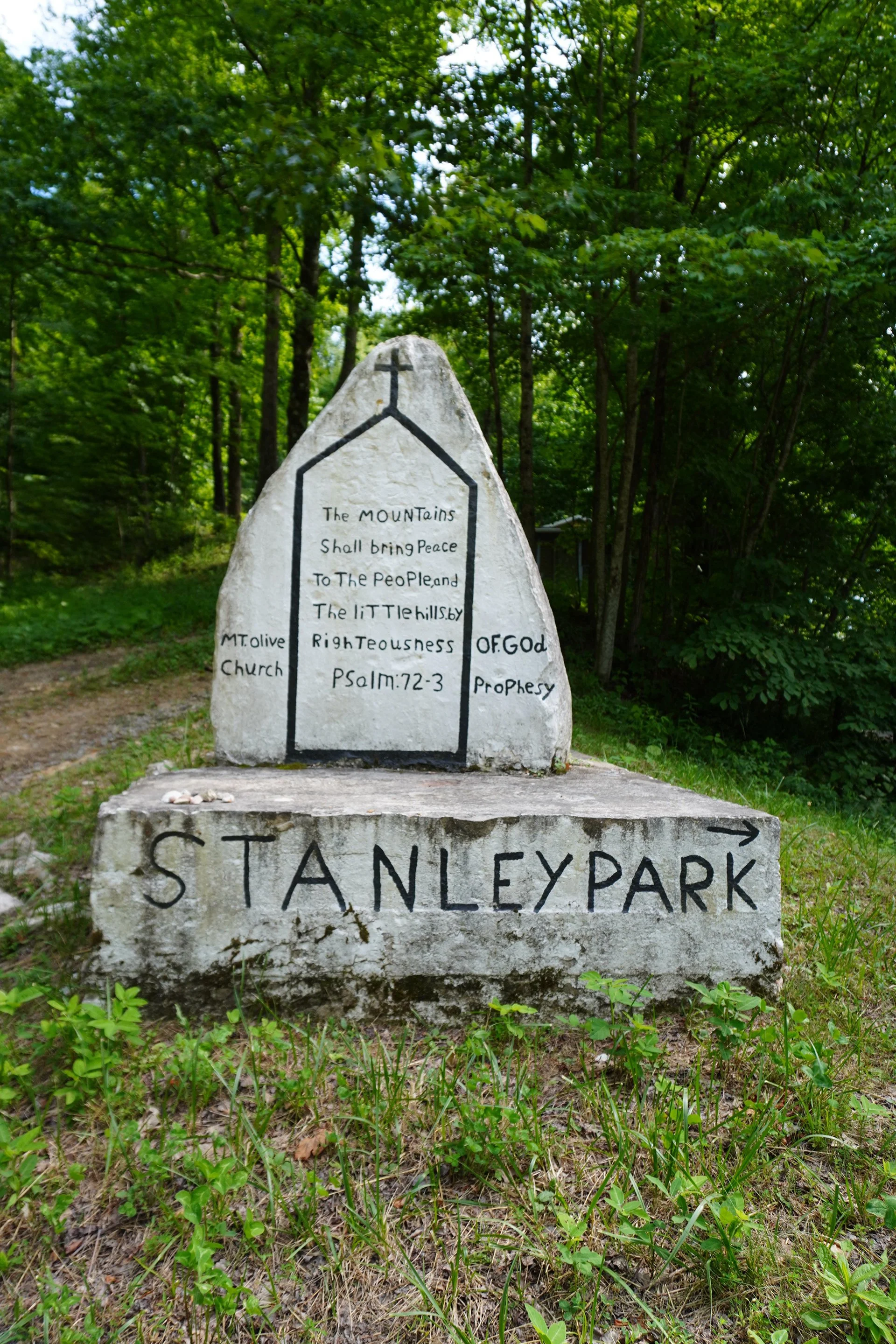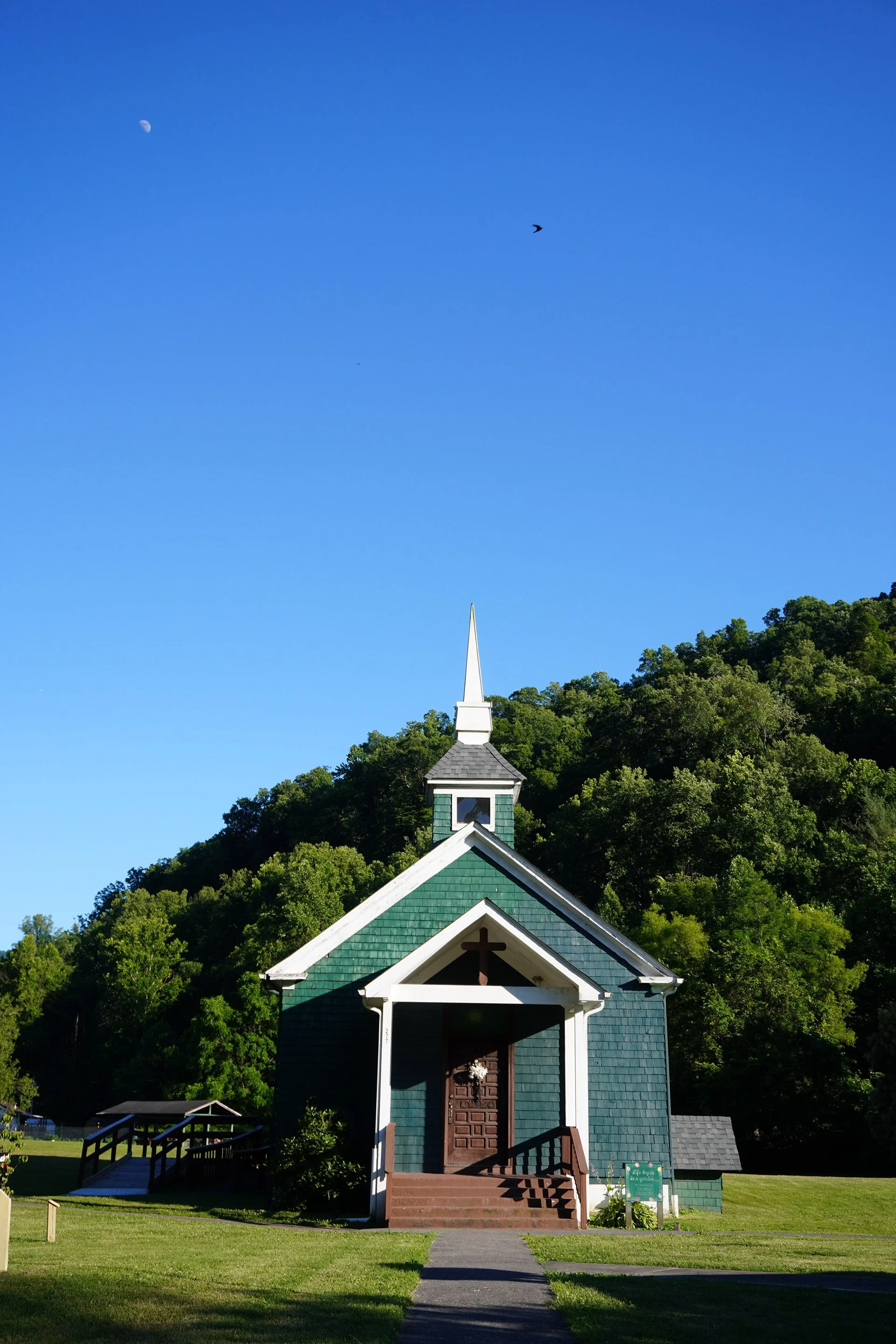Mountain “Mama”
By Bridgette Bol
September 23, 2024
The outside of the manse, called “Home School”
Over Kayford Mountain and into the valley, outside the reach of modern technology lies Colcord, West Virginia. Population 113. Home to not only one old white man named Gary, but two. Colcord is surrounded by hollow mountains with light brown tops. The mining companies have looted the land of its coal and its color, and subsequently its people have been drained.
Driving up Home School Rd. while John Denver’s “Country Roads” plays in the background, the one room church stands tall and green (or blue depending on who you ask). Just past the church lies the manse. The manse is a large brick house that the service groups used to stay in, though my youth group is the only one that comes anymore. Beyond the end of the dirt road, a narrow path (dug out by children sporting mullets atop ATVs) tumbles into the shallow creek lined with stones. The arching tree over the creek creates a haven of respite after a long day of work. Sometimes we spot a water snake through the crystal clear water and evacuate in a burst of shrieks and high-knees.
I have returned to Colcord almost every summer since I was 11. My first year I crammed into the minivans with all the high schoolers and my two other middle school companions. The ride is long and Drammamine filled as we navigate the twists, turns, and high-speed coal trucks on the narrow roads. I didn’t know when I first arrived at the manse (that looked straight out of the 60’s, with shag carpet in the dining room and powder blue counters in the kitchen) that it would become one of my favorite places on Earth. Upstairs, metal bunks line the walls in five different bedrooms, though I always run to claim the same top bunk in the room at the end of the hall overlooking the church (even though the red carpet is littered with dead bugs after a year without inhabitants). By far the best room in the house is the living room. The light blue walls will be forever associated with air conditioning and Euchre in my mind after spending so many afternoons tucked in there with a book, my hair still wet from a dip in the creek. However, my favorite part of Colcord isn’t the beautiful mountains or spending time with some of my best friends, it’s the opportunity to form relationships, trust, and understanding with the people that live there.
Gary has a head full of luscious white hair tucked into a short ponytail at the nape of his neck. His long white beard has the added effect of making him look like Appalachian Santa. He proudly sports a West Virginia University tattoo on his left forearm. His signature outfit is a khaki button down with the sleeves cut off and long green, camo-printed, cargo pants. I have never seen him using more than the bottom two out of six buttons on his shirt. Sometimes he pairs his outfit with a camo take on a West Virginia University trucker hat. His glasses are small rectangular frames that are permanently tinted to protect his eyes from the sun. He is always wearing boots and shakes his head at me when I walk through the field in between the manse and the creek in my pink sandals.
Gary Stanley next to his side-by-side.
Gary lives in his three-room ranch style home, nourishing the village with his California Reaper hot salsa that makes your eyes water, and your face turn red (I learned the hard way). He is a beacon of the community and continues to help others, even when they might not deserve it. Gary’s pride and joy is his dog Doofus, an excitable black pit bull who is constantly looking for attention and something fun to do. Despite Gary’s evident love of Doofus, his side-by-side (which I have been vehemently told is different from a four by four) may be his true pride and joy. If you’re brave enough, Gary will take you and one other person up to Stanley Park.
Continuing on the steep gravel trails we reach a marker that resembles a gravestone. Inscribed in scratchy letters, “Stanley Park” reads along the bottom with “The mountains shall bring peace to the people and the little hills by righteousness. Psalm: 72-3,” above. While I snapped a couple photos of the landmark, five trucks raced up the narrow path and skidded to a stop. Men exited the RAM trucks with their faces caked in coal. The whites of their eyes shone through the screen of black as they cracked open beers, leaving the caps strewn on the dirt. Though the coal mining industry continues in West Virginia, the number of coal miners in the state has been dramatically decreasing. The coal trucks rarely blow through Colcord anymore, though they can be seen from the larger neighboring town of Whitesville. Gary made small talk and accepted a beer, making sure Matt and I weren’t gonna tell Meredith, our anxious group leader, that he was drinking and driving.
Once we reached the top of the mountain, Gary started pointing out smoke coming from across the valley. It was the sawdust of trees being logged and thrown down the mountain. Gary explained that after the coal mining industry in West Virginia collapsed, Colcord was left with a desecrated environment and a lack of jobs. In order to continue to make money from the land, companies have now started heavily logging the mountains that used to be filled with coal. When the remaining younger folk in the village were faced with unemployment, some turned to drugs. Over the years in Colcord, I have seen horror stories of Shaken baby syndrome due to one or both of the parents being strung out on meth. West Virginia has the highest rate of drug abuse in the U.S. This past summer, the crack-house was newly renovated, sporting a tall barbed-wire fence around the property and multiple security cameras, as well as some fresh bullet holes in the side of the house. The crack-house is one of the nicest houses in Colcord.
Gary Stanley stands on top of Kayford Mountain.
The stone marking Stanley Park.
Art Petty was the job supervisor for the WV MAW (Ministry of Advocacy & Workcamps) worksite in Colcord, WV for sixteen years. When I first met Art when I was eleven years old, he woke up at 4:00 AM every morning and watched the sun rise while drinking an entire pot of coffee and smoking a pack of cigarettes. When I was younger Art would load everyone into his truck and hand you a packet of red Kool Aid if you were in the passenger seat. Since the pandemic, Art was diagnosed with lung cancer and has quit smoking. He is in remission and doing well, but is no longer a constant visitor at the Home School. Once per trip, Art comes over the mountain and through Stanley park at 7:00 AM to pay a visit. Those who want to have a chat (or an interview in my case) need to wake up early and be on their game, because Art is not shy in pointing out when he thinks you look like shit. One of Art’s rules of conversation is to not talk about politics, though he once let it slip that he left his church because they refused to aknowledge same-sex marriage, “Not any o’ my business who people wanna kiss.”
Inserted is a transcription of an interview conducted on June 17, 2024 with Art Petty
Art: Alright, well what do ya wanna know.
Bridgette: First, what is your full name?
Art: Arthur Thomas Petty Jr.
Bridgette: What is your favorite jobsite that you’ve worked at?
Art: Home School.
Bridgette: Really?
Art nods his head slowly
Art: I have sixteen years of experience, and had hundreds of groups come in, and I enjoyed every minute of it. Some of the best people I ever met in my life come with these groups.
Bridgette: Alright, the next question is more fun. Can you tell me the craziest animal encounter you’ve ever had?
Art: A dog.
Bridgette: Really? I thought you fed Little Debbies to bears.
Art: A dog came up to me on my front porch, he licked me, and said “Mama, Mama”.
Our surrounding audience bursts into giggles
Art: My wife’ll tell you. I said, I’m not your mama.
I smile and shake my head slowly
Bridgette: Alright.
Art: A dalmatian.
Bridgette: Really? And what’s your favorite part about living here?
Art: My favorite part? Well I don’t live here, I live over in Cabin Creek to the west of this town. But my favorite part about over here is the wonderful people that I’ve met through West Virginia MAW Organization. That will go with me ‘till the day I die. I remember the first group that came in, and I’ll remember the last one.
Art Petty leans over a railing while being interviewed.
Colcord, WV is filled with people trying their best. Trying their best to find work after their land has been desecrated and their jobs have been dismissed. Trying their best to fight the drug epidemic that is far too close for comfort. Trying their best to do the right thing and help their neighbor. The people of Colcord tell a story of resiliency and kindness. Kindness when we are offered cold Coke’s on a job site, or each given a two-dollar bill from Perk when we rebuilt her porch. When Kathy supplied us with pizza, and every year when Gary pays for our ice cream before we even get to the parlor (named Hillbilly Rick’s by the way). Or during a power outage, when a family down the road offered to open the emergency relief center so we could have running water. Every year I choose a new motto that had inspired me the year before, this year it is “To understand others, that’s the beginning of kindness.” I believe that the people of Colcord are an excellent example of people hoping to be listened to long enough to be understood.
The caravan slowly pulls away from Home School as Gary Stanley waves from the front porch with a sad smile on his face. Immediately, John Denver’s “Take Me Home, Country Roads” blasts from the sound system to combat the melancholy feeling filling the minivan (it will continue to play every hour, on the hour, all 10 hours home). I know that when I return next year the mountaintops may be a little less green, but dead bugs will still litter the red carpet and hornets' nests will be outside the windows. Art may be in his house up on Cabin Creek Road instead of Home School, but Emmet will still belt songs in church on Sunday to a pre-recorded track lagging slightly behind him. Gary will still show up on Saturday night and our faces will still turn red and well with tears after a bite of his hot salsa.
The Colcord Presbyterian Church
